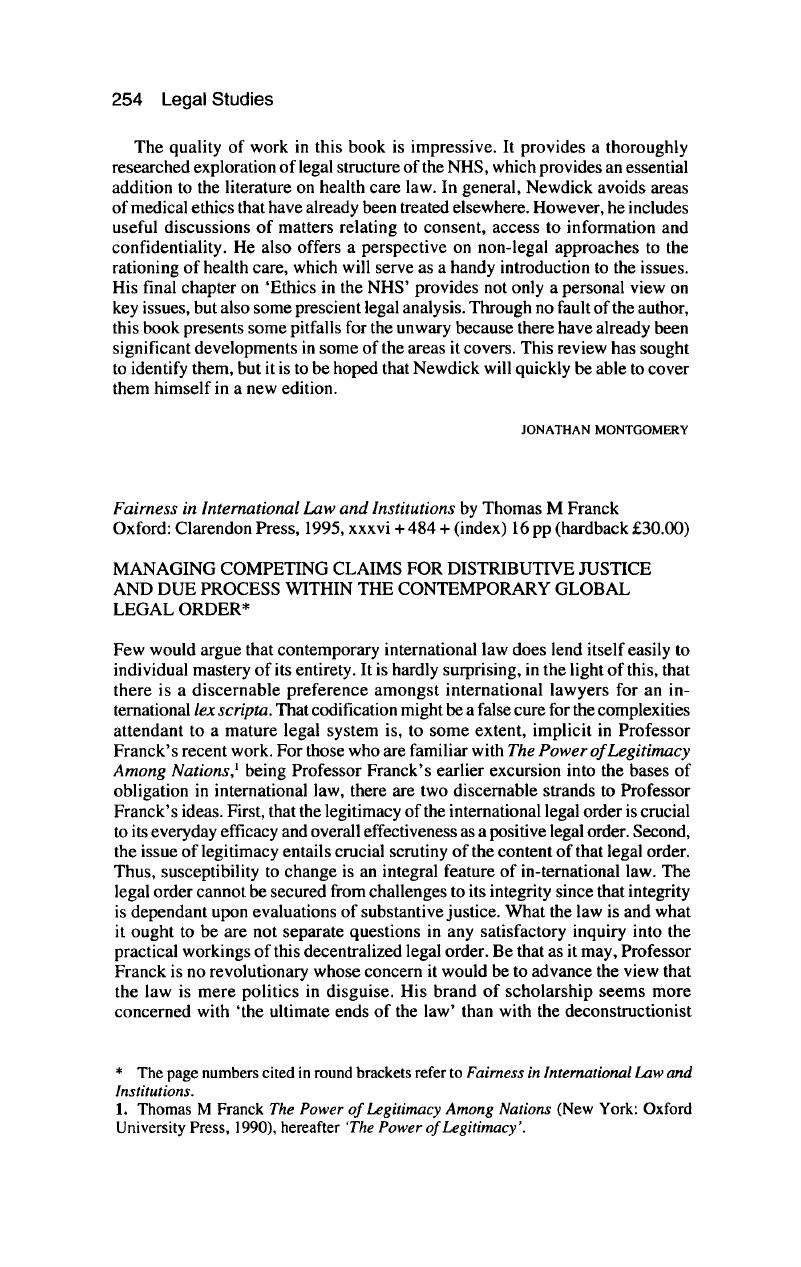No CrossRef data available.
Published online by Cambridge University Press: 02 January 2018

* The page numbers cited in round brackets refer to Fairness in International Law and Institutions.
1. Thomas M Franck The Power of Legitimacy Among Nations (New York: Oxford University Press, 1990), hereafter ‘The Power of Legitimacy’..
2. See for example, David Kennedy ‘Theses About International Law Discourse’, 23 German YBIL, 1980, 353; David Kennedy ‘A New Stream of International Law Scholarship’, 7 Wis ILJ, 1988, 1; Martti Koskenniemi From Apology to Utopia: The Structure of International Legal Argument, (Helsinki: Finnish Lawyers' Publishing Company, 1989).
3. Walter Wheeler Cook The Logical and Legal Bases of the Conflict of Laws, (Cambridge: Harvard University Press, 1942). at p ix.
4. John Rawls A Theory of Justice, (Oxford: Clarendon, 1972), at p 154.
5. But compare Jurgen Habermas on communicative rationality and argumentation with Michel Foucault on the knowledge/power relation See Michel Foucault ‘The Subject and Power’. in HL Dreyfus & P Rabinow Michel Foucault: Beyond Structuralism and Hermeneutics, (Brighton: Harvester, 1982) (afterword); and Jurgen Habermas The Theory of Communicative Action, Vo I (Boston: Beacon, trans T McCarthy, 1984).
6. See Roberto Mangabeira Unger The Critical Legal Studies Movement (Cambridge, Mass: Harvard Univ Press, 1986). at pp 39 and 53–56.
7. Ronald Dworkin Law's Empire (Cambridge, Mass: Belknap/Harvard Univ Press, 1986). at pp 78–85, 266–267.
8. See Chandran Kukathas & Philip Pettit Rawls: A Theory of Justice and its Critics (Cambridge: Polity, 1990), Ch s 5 and 6.
9. Ibid, at pp 134 et seq..
10. R W M Dias ‘Mechanism of Definition as Applied to International Law’, CLJ, 1954, p 215.
11. Koskenniemi, op cit, also Kennedy (Book Review), 21 Harv ILJ, 1980, p 301.
12. J Dewey Logical Method and Law’, 10 Cornell LQ, 1924, p 17, at p 23.
13. Franck Accepts that determinacy reinforces ‘stability of expectations’ where this last is an aspect of legitimacy (at p 34).
14. H L A Hart The Concept of law, (Oxford: Clarendon, 1961) at pp 81 er seq.
15. OW Holmes ‘The Path of the Law’, X Harvard LR, 1897, p 457, at pp 460–461.
16. Franck The Power of Legitimacy. op cit, at p 1.
17. This search remains open to Kant's dictum that ‘reason is the pupil of itself alone’; Immanuel Kant Critique of Pure Reason, transl by J M D Meiklejohn (London: Everyman, 1934, reprint 1964), at p 11 (Preface to the 2nd edn of 1787). Thus, the concept of causation is itself a creature presupposed by scientific reason.
18. And this itself is a political issue and not, say, a semantic issue as to what counts in attracting the appropriate use of the word ‘law’; Ronald Dworkin ‘Legal Theory and the Problem of Sense’ in Ruth Gavison (ed) Issues in Contemporary Legal Philosophy: The Influence of H L A Hart, (Oxford: Clarendon, 1987), p 9, at pp 15–19).
19. Robert N Moles Definition and Rule in Legal Theory: A Reassessment of H L A Hart and the Positivist Tradition, (Oxford: Blackwell, 1987). at p 95: ‘Unless Hart can give some account of what it means to say that the authorising rule exists independently of the fact of obedience, he can hardly claim, as he does, that it is a reason for that obedience’.
20. See John Finnis Natural Law and Natural Rights, (Oxford: Clarendon, 1980), ch I. For a possible approach towards drawing a middle way between treating law as bare convergences of habitual behaviour on the one hand and adopting moral-political excellence as the focal meaning of law on the other, see Rolf Sartorius ‘Positivism and the Foundations of Legal Authority’, in Gavison (ed), op cit, p 43, Pt 1.
1. And possibly one that is beginning to lose its appeal; see the remarks by Jonathan I Chamey, ‘Law of the Sea: the Convention Enters into Force’, 89 Proc ASIL, 1995, p 451.
2. The role accorded to the proportionality principle in the judgment of the Court in the North Sea Continental Shelf cases and in the Anglo-French arbitration are examples of this; ICJ Reports (1969) at pp 52–54, paras 89 and 101D(3); ILR 54, p 6, at pp 67–68, paras 98–101 respectively.
3. Eg GSP within GATT.
4. ICJ Reports (1985) at pp 45–46, para 58.
5. The court deemed the principle of proportionality inappropriate since ‘the area to which the Judgment will in fact apply is limited by reason of the existence of claims of third States’, ibid, para 74.
6. Z Wlosowic The Malta/Libya Case: Shelf Delimitation by the Distance Principle and How to Influence decisions without intervening’, 44 CLJ, 1985, p 341, at p 344.
7. Of which see now Agreement Relating to the Implementation of Part Xi of the United Nations Convention on the Law of the Sea, 18 August, 1994, 33 ILM, 1994, p 1099; D H Anderson ‘Further Efforts to Ensure Universal Participation in the United Nations Convention on the Law of the Sea’, 43 ICLQ, 1994, p 886.
8. Rawls, op cit, at p 303.
9. 86 AJIL, 1992, p 46.
10. See Michla Pomerance The United States and Self-Determination: Perspectives on the Wilsonian Conception’, 70 AJIL, 1976, p 1.
11. Alfred Cobban National Self-Determination, (London: OUP, 1945), at pp 4–5.
12. Antonio Cassese Self-Determination of Peoples: A Legal Apparaisal, (Cambridge: Grotius-CUP, 1995). at pp 277–312; Rein Müllerson International Law, Rights, and Politics: Developments in Eastern Europe and the CIS, (London: LSE & Routledge, 1994), at pp 58–91; Jean Salmon ‘Internal Aspects of the Right to Self-Determination: Towards a Democratic Legitimacy Principle’ in Christian Tomuschat (ed) Modern Law of Self-determination, (Dordrecht: Martinus Nijhoff, 1993) p 253.
13. See The Power of Legitimacy, op cit, at pp 153–174.
14. Michael Akehurst ‘Custom as a Source of International Law’, XL VII BYBIL, 1974–75, p 1, at pp 42–44; G M Danilenko Law-Making in the International Community (Dordrecht: Martinus Nijhoff, 1993), at pp 158–162.
15. See Further Thomas Nagel Equality and Partiality, (New York: OUP, 1991).